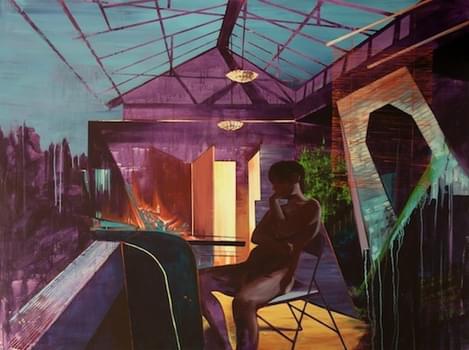Sea Change - Breakage
"Breakage"

Freedom and escape present themselves as Breakage's core themes from the offset. The record's first three songs speak literally and metaphorically about breaking things or fleeing from a situation (a reinforcement, too, of the album's title). "Out of this place out of this house", Sundes breathes on "Squares", her glassy vocals threatening to break over creeping Scandipop synths and trigger-sharp drum machine beats.
"Let's rip this place apart" she begs on "Let's Dance", the strongest example of Sundes' enviable talent for musical build and release. A simple 4-note melody circles electronic scuttles and ghostly oohs before hefty industrial synths lurch forth. The minimalistic build up never fails to leave you without your hairs stood on end; it's cathartic, a release, pertinent to Sundes' feelings about reaching freedom. “One thing I feel very strongly about is freedom and the need to let things go," she says. "I've spent so much time being too shy to show people my music or even actually write finished songs because of my own self-censorship."
Well thank god she's made that leap of faith, for nearly every song on Breakage is confidently written and produced. Sundes learnt production at school as a music student and recorded the entire album in her Oslo bedroom but its crystalline finish would make you think otherwise. That confidence shines through most brightly on "Wooden House" and "Above". The former opens with eerie electronics that tunnel right into your soul, setting the scene for the remainder of the album. As Sundes dances around glowing micro-house synths that sound like they're from a John Talabot record, she spurs a dark, twisted romanticism of looking for a loved one lost in some icy hinterland. "Where did you go in the wooden house?" she wonders. "Where is this place I've forgotten about? /[...] are we searching under stones /[...] tie off my feet now and pull my body to the ground". Of course, it could be the unrequited love and/or destructive love Sundes touches upon throughout the album; the kind of love that hinders the freedom she so desires.
"Above" is the strongest example of Sea Change exploring destruction, yet again nodding to that oh-so clever album title. Full of sprightly glockenspiel-esque sounds, playful beats and Sundes' breathtaking vocal, the track is by far her biggest venture into pop territory and is a definite album highlight. "You leave me and high and dry when I want so much more", she cries over an explosive, kinetic chorus that begs to played over and over again.
Breakage does very occasionally shed you of such impulse, though. For some listeners it may even be a little too stylised. "We Run", precious as it is with starry-eyed synths and dreamy drone, never seems to go anywhere. The weakest track on the record, "Knives", simply feels directionless - filler for an otherwise solid debut.
These two tracks evidence Breakage as a slightly top heavy album until the incredible closer, "Raan". Here, Sundes reaches the crux of "letting go". It's an immediately disconcerting song built on a bed of warped and sunken techno with Sundes singing in joyful discordance. "I'm afraid of the colours you make" is the most perfect lyric for this sense of unease; we can at once comprehend and not comprehend it. A vastly inspiring, experimental gem at the end of a quietly ambitious collection of songs.
Sundes has certainly achieved what she set out to do on Breakage. It's an immersive, infectious and beautiful example of interesting though not alienating atmos-pop. We'll be playing it 1,000 times.
Get the Best Fit take on the week in music direct to your inbox every Friday

Gwenno
Utopia

KOKOROKO
Tuff Times Never Last

Kesha
.





